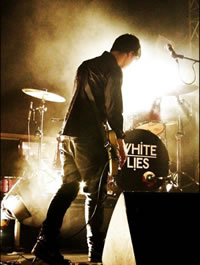White Lies - To Lose My Life
Jack Collins reviews local band's no. 1 debut album
Hailing from West London, White Lies are the latest band to be rolled off as the next big thing by the Media hype machine.
Absolute Radio, XFM and Radio 1 all wanted to be in on White Lies as they hit the big time. The hype paid off, and their debut album ‘To Lose My Life,’ hit Number 1 on the first week of its release. And to make a change, the hype machine has chosen someone who isn’t just another manufactured, copy of everything else in popular music.
Somewhere between U2 and New Order, White Lies are miles away from the generic sounds of ‘Scouting for Girls’. Unlike them, their music isn’t aimed at teenage girls, and to make millions immediately. ‘To Lose My Life’ has messages that are meaningful, and the lyrics of an extremely talented young songwriter leading it.
The album opens with previous single, ‘Death.’ The infectious bass riff and positive sound contrast stunningly with the morbid message of the song. Lead singer Harry McVeigh’s voice, comparable to that of Joy Division’s Ian Curtis, tells of a distressing dread of death itself, and whatever comes beyond it.
The morbid message is carried through into the second track, new single, ‘To Lose My Life.’ It has another killer bass riff, and lyrics that seem to echo Smiths influences on the band. At least lyrically, this is probably the strongest track on the album, and McVeigh shows his own lyrical prowess when he tells that “there’s a part of me that still believes, that my soul will soar above the trees. But a desperate fear flows through my blood, that our dead loves buried beneath the mud.” McVeigh speaks for a large proportion of the population, who have an unnerving fear of dying, and the lyric drew on my emotions at least, due to the fact that it was such a perfect reflection of my own feelings towards passing away.
The next track, ‘A Place to Hide,’ is reminiscent of later U2, but despite its different, more positive message, isn’t really that different from either of the two leading singles. ‘Fifty Our Foreheads’ changes the approach of the album somewhat, slowing down the tempo, and showing a softer side to White Lies. Again, it has a stadium worthy chorus, but the verses are slower and mellower than anything else on the album.
‘Unfinished Business’ though, is where White Lies’ soft side really shows its true class. The addition of an organ gives the song a sense that it wouldn’t seem out of place at a funeral. Again, brilliant lyrical writing is shown by McVeigh in his wordplay, and these combined with the instrumentation, make this one of the best songs on the album.
‘E.S.T.’ shows a darker side to the White Lies sound, at least in the verses, and talks of dreams. “You can tie my hands to the walls, but you can’t tie my dreams to this place,” is probably the most powerful lyric on the album, but the song, which starts on such a positive note, slides back into yet more messages about bereavement, as the song ends with the repeating of the message “I hope you remember me,” before a repetition of the introductory passage.
More long held notes, more talk of death and funerals, “From the Stars,” really doesn’t add much to the album at first, and the lyrics seem to lack the quality that they do in earlier songs. However, when the strings kick in with their repeating sharp, short passage under big, stadium sized chords from McVeigh’s guitar, the song’s inclusion begins to make sense, and as the listener, I get the feeling that it would be much better performed live.
‘Farewell to the Fairground’ follows; a message about leaving the hometown. Shimmering strings and more big chords keep the listener interested, even if again, the lyrics don’t stand up to the quality of the earlier ones. ‘Nothing to Hide’ is a song about love and its failings, and the McVeigh’s words return to the exquisite standard of the earlier tracks. His voice aswell, cuts through the song beautifully, and sets up the final track on a high standard.
Closer ‘The Price of Love’ starts quietly, the strings building suspense with single held high notes over a slow, small drum beat. McVeigh’s voice grows on the listener as the song slowly starts to expand. Punchy guitar and drums keep the song steady building into the fast paced chorus, before the vocals and guitar both suddenly drop out, leaving the strings exposed on one extremely fast riff. This crescendos gradually until McVeigh brings everything exploding back in one final chorus with the call ‘Is this the price of Love?’
This album isn’t the best thing I’ve ever heard. It isn’t as good as the debut albums from bands such as Franz Ferdinand, or the Arctic Monkeys’ ‘Whatever People Say I am…’ But there’s something about this album, which opens the door for White Lies. The album shows glimpses of absolute class, that’s not common these days. McVeigh is an extremely talented lyricist, and White Lies have the world at their feet if they carry on making music as good as this.
Jack Collins
February 13, 2009
Related links
|
